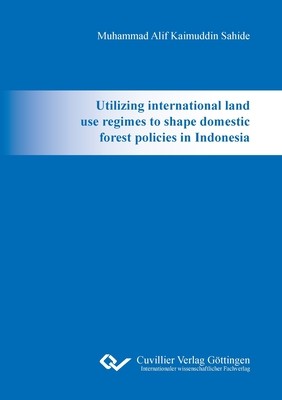
- We will send in 10–14 business days.
- Author: Muhammad Alif Kaimuddin Sahide
- Publisher: Cuvillier
- ISBN-10: 3736992165
- ISBN-13: 9783736992160
- Format: 14.8 x 21 x 0.6 cm, softcover
- Language: English
- SAVE -10% with code: EXTRA
Utilizing international land use regimes to shape domestic forest policies in Indonesia (e-book) (used book) | bookbook.eu
Reviews
Description
Being organized into five chapters, this research detects the utilization of global and regional land use regimes by national bureaucracies. This research identifies domestic political background on utilizing international regimes within specific Indonesian land use change settings, a topic which has to date been neglected in this research field, with a few exceptions. Subsequently, the research poses several sub-questions to break down the main research question, which are as follows: 1. What are the bureaucracies and their tasks as well as their legal options to pursue actual and potential interests in steering land use transformation systems in Indonesia? 2. How did the domestic bureaucracy, together with international actors, use and adapt national instruments and international support to pursue their own (international and domestic) interests in several cases of land use transformation in Indonesia, such as (a) certification of palm oil and (b) Forest Management Units (FMU) and community forestry (CF)? 3. How did the domestic bureaucracy utilize the Association of Southeast Asian Nations' (ASEAN) regional forest and environmental regime complex? 4. How is the relevance of international and regional regimes used in domestic bureaucratic politics?
EXTRA 10 % discount with code: EXTRA
The promotion ends in 20d.07:51:17
The discount code is valid when purchasing from 10 €. Discounts do not stack.
- Author: Muhammad Alif Kaimuddin Sahide
- Publisher: Cuvillier
- ISBN-10: 3736992165
- ISBN-13: 9783736992160
- Format: 14.8 x 21 x 0.6 cm, softcover
- Language: English English
Being organized into five chapters, this research detects the utilization of global and regional land use regimes by national bureaucracies. This research identifies domestic political background on utilizing international regimes within specific Indonesian land use change settings, a topic which has to date been neglected in this research field, with a few exceptions. Subsequently, the research poses several sub-questions to break down the main research question, which are as follows: 1. What are the bureaucracies and their tasks as well as their legal options to pursue actual and potential interests in steering land use transformation systems in Indonesia? 2. How did the domestic bureaucracy, together with international actors, use and adapt national instruments and international support to pursue their own (international and domestic) interests in several cases of land use transformation in Indonesia, such as (a) certification of palm oil and (b) Forest Management Units (FMU) and community forestry (CF)? 3. How did the domestic bureaucracy utilize the Association of Southeast Asian Nations' (ASEAN) regional forest and environmental regime complex? 4. How is the relevance of international and regional regimes used in domestic bureaucratic politics?


Reviews